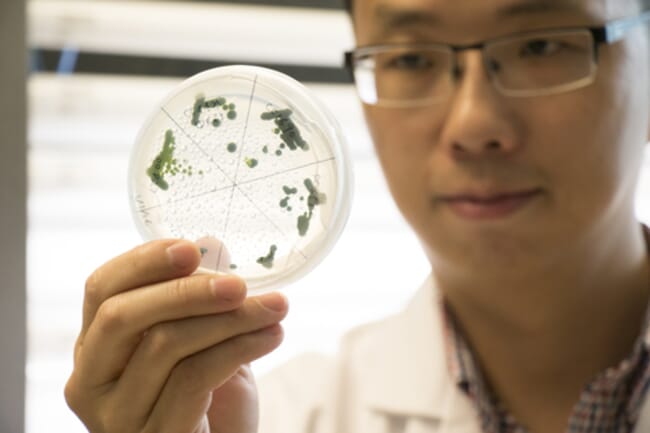
Scientists are developing a technology that uses algae to capture the greenhouse gas emitted from power plants, wastewater treatment plants and cement factories before it can enter the atmosphere. © Cheryl Nemazie, University of Maryland Center for Environmental Science
Researchers from the University of Maryland Center for Environmental Science and the Institute of Marine and Environmental Technology have been awarded a three-year, $2 million grant from the US Department of Energy to understand how microalgae can be used to reduce carbon dioxide emissions from power plants.
“Climate change is one of the biggest challenges facing our society today and IMET is thrilled to be contributing to solutions to carbon dioxide emissions through or microalgal research programme,” said Russell Hill, director of the Institute of Marine and Environmental Technology.
Carbon dioxide is a greenhouse gas that contributes to global warming, and innovative ways to reduce emissions are urgently needed to curb the trajectory of warming on the planet. With partners in academia and industry, scientists are developing a technology that uses algae to capture the greenhouse gas emitted from power plants, wastewater treatment plants and cement factories before it can enter the atmosphere. The outcome will be a scalable and deployable system in which the algae sequester carbon from flue gases and then can be harvested for sale as nutraceuticals, animal feed and biofuels.
“Our technology offers the opportunity to install a cost-effective green technology that captures carbon dioxide from flue gases while generating valuable bioproducts,” said Yantao Li. “Its modular and scalable design allows a small installation to grow into a major carbon dioxide mitigation system with its expansion paid for by the technology itself.”
Scientists Feng Chen, Russell Hill and Yantao Li from the Institute of Marine and Environmental Technology and partners in academia and industry have a long track of record of research on using microalgae to mitigate carbon dioxide emission from power plants to address climate change and carbon dioxide emission issues. Researchers have been working with Maryland business start-up HY-TEK Bio for the past decade to develop a microalgae-based system to reduce industrial-scale carbon dioxide emissions and simultaneously produce valuable by-products like biofuels and nutraceuticals.
The technology has been used to capture carbon dioxide being released from the Back River Waste Water Treatment Plant’s powerplant flue gases. The algal carbon sequestration technology being developed at IMET is the first of its kind to reduce greenhouse emissions on an industrial scale with the added economic benefit of being able to harvest the algae for sale as animal feed, biofuels and nutraceuticals. The team’s collaborative efforts were previously funded in 2020 by the US Department of Energy’s Office of Fossil Energy for its work in using algae to capture carbon dioxide.
“The University of Maryland Center for Environmental Science is pleased to receive this prestigious grant from the Department of Energy to work with partners in academia and industry to harness the power of algae to remove carbon dioxide from a power plant,” said President Peter Goodwin. “Addressing the challenges of climate change is UMCES’ priority, and innovations like these are a game changer for Maryland and the nation to meet greenhouse gas emissions reduction goals.”




